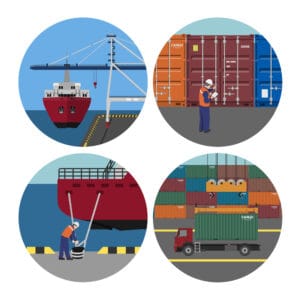WORKERS’ COMPENSATION FOR LONGSHOREMEN & HARBOR WORKERS
 Employers must purchase federal workers’ compensation coverageif their businesses are on, or adjoining, the navigable waters of the United States, as required by the Longshore and Harbor Workers Compensation Act (LHWCA).
Employers must purchase federal workers’ compensation coverageif their businesses are on, or adjoining, the navigable waters of the United States, as required by the Longshore and Harbor Workers Compensation Act (LHWCA).
- Larger employers can elect to self-insure.
- All employers can purchase coverage for compliance through insurers who specialize in this market.
- There are approximately 400 insurance companies and 200 self-insured companies providing coverage for LHWCA claims.
While The LWHCA Covers The Employers
While the LWHCA covers the employers of dock hands unloading and loading the ocean going ships, it also covers many other types of employers.
Other employers covered by the LHWCA include:
- Ship builders
- Ship repairers
- Grain elevators at riverside
- Inland commercial ports
- Boat and barge builders located on navigable rivers of the country
- Any other business that ships cargo over navigable water ways
Due To The Nature Of Loading And Unloading Ships And Barges
Due to the nature of loading and unloading ships and barges, the work results in a higher than average number of injuries.
- The severity of the injuries tends to be greater than normal.
- Musculoskeletal injuries have a disproportionately larger share of the injuries.
Medical benefits are provided by the physician of the employee’s choice, but the physician has to be pre-approved by the office of the Secretary of the U.S. Department of Labor. In addition to all necessary medical care, the employee is also entitled to vocational rehabilitation if the employee is unable to return to the prior job.
Due To The Physical Demands
Due to the physical demands and unionization of longshoremen and harbor workers, they often earn above average incomes even though most have no education beyond high school.
- Indemnity benefits under the LWHCA are two-thirds of the employee’s average weekly wage, with a maximum benefit of $1,224.66 for accidents occurring between 10-1-09 and 9-30-10.
- The Department of Labor adjusts the maximum benefit each fiscal year.
Many Workers In These Industries
Many workers in these industries are members of labor unions with pension funds and other benefits provided by the union.
- In some cases, the employees who are out of work are not well regarded by their peers because disability benefits deplete the welfare funds which are needed by retiring workers.
- Vacation policies should be evaluated to make sure they do not cause a disincentive to return to work if an employee who is out of work can accrue benefits faster than those who are working.
- For these reasons, the unions are often receptive to return to work programs.
Transitional / Modified Duties for Longshoremen & Harbor Workers
Effort should be made to accommodate restricted employees in this line of work when possible. Employees and employers may be motivated to utilize modified duty to avoid depletion of the welfare fund. Speak with the union to determine if there is a monetary disincentive to return to work and try to remove those disincentives. Placement with a non-profit should be considered to keep an employee active and productive versus being at home dwelling on an injury and disability.
If there is an applicable Union Contract, be sure to review the terms to verify modified duty is not prohibited or restricted. Possible modified opportunities include:
Sample Transitional Duty Jobs for Longshoremen & Harbor Workers
| Longshoreman or Harbor Worker: |
Allow the employee to work in the office completing paperwork, data entry or on a shredding or filing project. |
| Longshoreman or Harbor Worker: |
Identify tasks such as filing, data entry or light cleaning that need attention in the office. |

